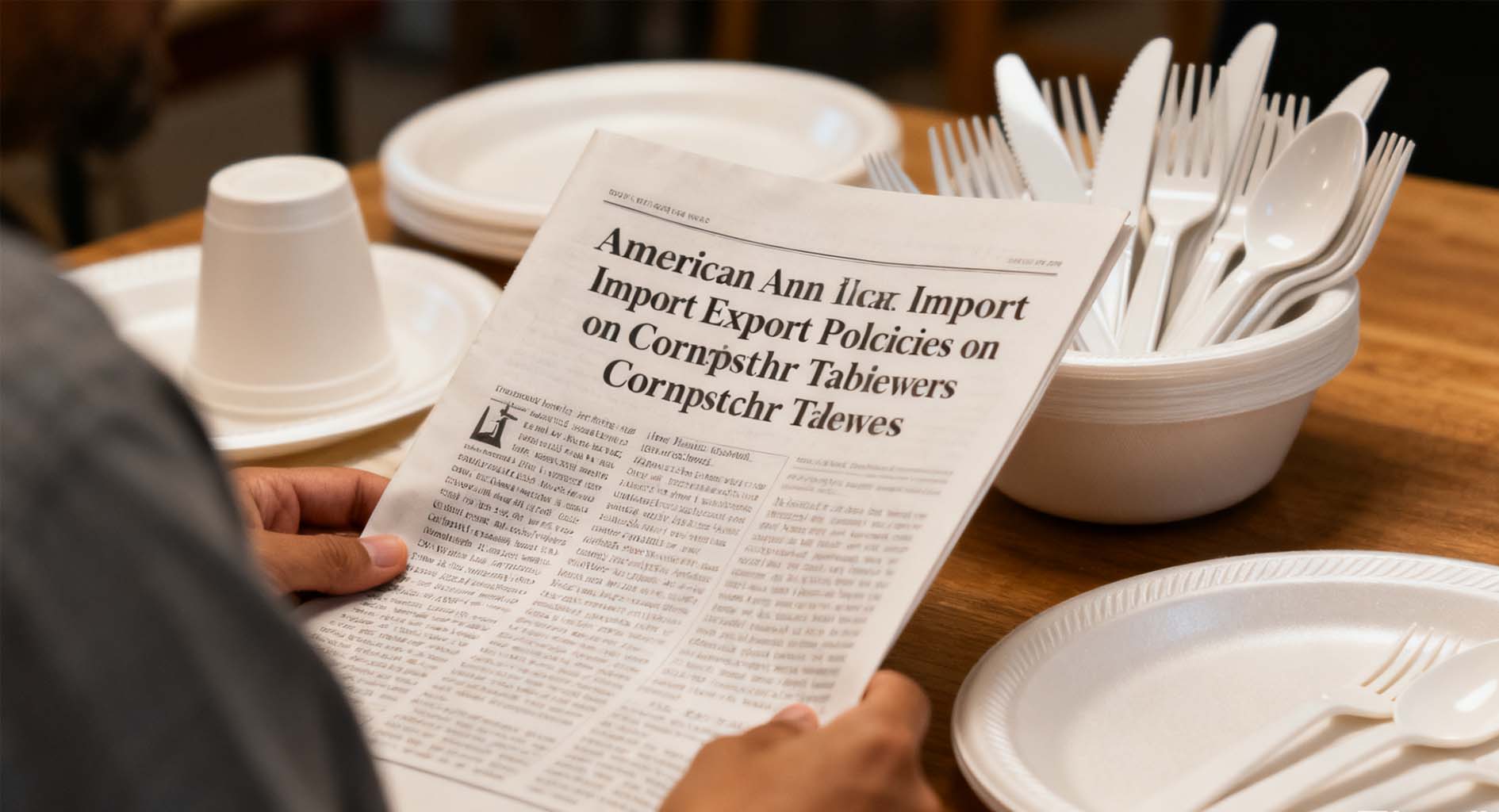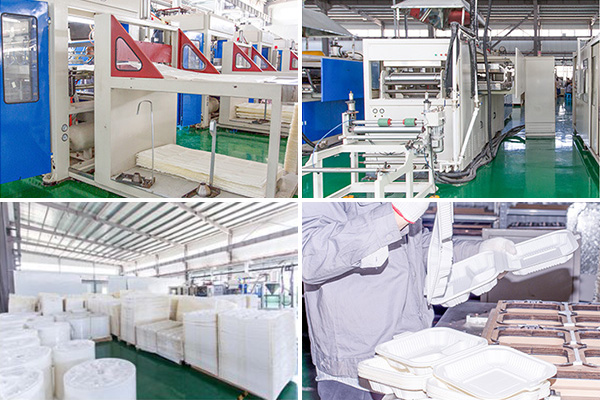This article explores North American import and export policies on corn starch tableware, covering regulations, certifications, and trade opportunities in the U.S. and Canada. It highlights the role of DASHAN in promoting eco-friendly, biodegradable products in compliance with global standards.
1. Introduction


As the world increasingly shifts toward sustainable practices, businesses and consumers are looking for innovative, eco-friendly alternatives to traditional materials. Cornstarch has emerged as one of the most promising solutions in this regard. From packaging to disposable tableware, cornstarch products are being adopted widely across industries due to their biodegradable and compostable properties. In particular, North America — especially the United States and Canada — has played a leading role in the development and regulation of corn starch-based products.
This article explores the policies in the United States and Canada regarding cornstarch tableware, focusing on food safety, environmental standards, certifications, and trade opportunities. Additionally, we will look at how companies like DASHAN are navigating these regulations to succeed in the North American market.
2. United States Policies
The United States is a key player in the global market for cornstarch-based products. The U.S. government has put in place a range of policies and regulations aimed at ensuring the safe use of biodegradable materials in various sectors, including food packaging and disposable tableware.
FDA Food Contact Safety Requirements
The Food and Drug Administration (FDA) is responsible for ensuring the safety of food-contact materials, including those made from corn starch. In the United States, any material that comes into contact with food must meet stringent safety standards. Corn starch tableware, such as biodegradable plates and containers, must comply with FDA regulations to ensure that they do not leach harmful substances into food.
USDA BioPreferred Program
The U.S. Department of Agriculture (USDA) introduced the BioPreferred Program to encourage the use of renewable, bio-based materials, including corn starch. This program promotes the use of biodegradable materials for food packaging and consumer goods. Corn starch products that qualify under the BioPreferred Program can help companies gain a competitive edge in the marketplace by meeting environmental goals while offering an eco-friendly alternative to petroleum-based plastics.
ASTM D6400 and ASTM D6868 Standards
For a product to be labeled biodegradable or compostable in the U.S., it must meet specific standards set by ASTM International. The ASTM D6400 and ASTM D6868 standards provide guidelines for compostable plastics, including those made from cornstarch. These standards ensure that products break down within a defined time frame, typically 90–180 days, and do not leave behind harmful residues. For companies exporting corn starch-based products to the U.S., meeting these standards is a crucial requirement for market entry.
3. Canada Policies
Canada has also established a strong regulatory framework for corn starch-based products, focusing on food safety, environmental protection, and consumer health. These policies provide the necessary guidelines for the safe import, sale, and use of cornstarch tableware.
CFIA Food Safety Regulations
The Canadian Food Inspection Agency (CFIA) is responsible for regulating food safety in Canada. Like the FDA in the U.S., CFIA ensures that materials that come into contact with food meet specific safety standards. Cornstarch products intended for food packaging must undergo safety assessments and must be approved by CFIA before they can be sold in the Canadian market.
Canadian Environmental Protection Act (CEPA)
The Canadian Environmental Protection Act (CEPA) governs the use and disposal of materials that may impact the environment. Under CEPA, cornstarch products are considered an eco-friendly alternative to traditional plastic. As part of Canada’s commitment to reducing plastic pollution, CEPA encourages the use of biodegradable materials, including corn starch, in a range of products, from food packaging to disposable tableware.
ECCC Standards for Compostable Materials
The Environment and Climate Change Canada (ECCC) sets regulations and standards for products that are compostable. The ECCC has developed guidelines for ensuring that compostable products, including those made from corn starch, meet strict environmental standards. By adhering to these standards, cornstarch products in Canada can be marketed as safe for industrial composting, contributing to the country’s efforts to reduce waste and promote sustainable materials.
4. Comparative Insights
While both the U.S. and Canada share a commitment to promoting sustainable, biodegradable materials, there are some differences in their policies.
U.S. vs. Canada Policy Differences
-
U.S. Focus on Certification: In the U.S., the emphasis is largely on certification and market-based incentives like the USDA BioPreferred Program and FDA regulations. These programs encourage businesses to adopt eco-friendly materials by offering certifications that can enhance product visibility and consumer trust.
-
Canada’s Comprehensive Environmental Approach: Canada takes a more comprehensive approach to the environmental impact of materials, as seen in the Canadian Environmental Protection Act and the ECCC standards. These regulations focus not only on food safety but also on the environmental benefits of biodegradable products, such as their ability to decompose in composting environments.
5. Trade Opportunities and Challenges
The trade landscape for corn starch-based products in North America presents both opportunities and challenges.
Market Opportunities
As awareness about environmental issues grows, both the U.S. and Canada are seeing a significant demand for sustainable packaging and biodegradable products. Cornstarch-based products are well-positioned to meet this demand, with growing adoption in sectors such as foodservice, retail, and hospitality. Additionally, government incentives and support programs make it easier for businesses to integrate cornstarch products into their supply chains.
Trade Challenges
Despite the opportunities, there are several challenges to navigating the cornstarch market in North America. Companies must comply with stringent certification requirements, such as ASTM D6400 and FDA safety standards, which can increase production costs. Additionally, international trade regulations, such as tariffs and import quotas, may impact the cost-effectiveness of exporting corn starch products to North America.
6. Case for Brands like DASHAN

For brands like DASHAN, the adoption of cornstarch products offers significant market advantages. By meeting the regulatory requirements in both the U.S. and Canada, DASHAN has successfully expanded its product offerings in North America. DASHAN offers a variety of biodegradable packaging solutions, including cornstarch food containers and takeaway boxes, that comply with both FDA and Canadian Environmental Protection Act standards. These products are eco-friendly, durable, and meet the growing demand for sustainable packaging.
DASHAN‘s Commitment to Sustainability
At DASHAN, we are committed to producing high-quality corn starch products that support our clients’ sustainability goals. Through innovative design and manufacturing, we provide businesses with environmentally friendly alternatives to plastic. Our custom packaging solutions cater to a range of industries, ensuring that companies can meet the rising demand for eco-friendly materials while complying with the regulatory standards of North America.

7. Conclusion
As global demand for sustainable solutions continues to rise, corn starch products are poised to play a crucial role in reducing plastic waste and promoting environmental responsibility. Both the United States and Canada have established strong policy frameworks to support the adoption of biodegradable and compostable materials. With the right certifications and adherence to environmental standards, businesses can take advantage of the growing market for corn starch-based products. DASHAN stands at the forefront of this movement, offering innovative and sustainable products that help drive the green revolution in North America.
FAQ
-
How long does it take for cornstarch products to decompose?
Cornstarch products typically decompose within months when exposed to proper composting conditions, much faster than traditional plastics. -
Are corn starch-based products truly biodegradable?
Yes, corn starch products are fully biodegradable and compostable, making them a better environmental option than plastic. -
How do cornstarch products compare to other biodegradable materials?
Cornstarch products are highly effective at decomposing and are often considered more sustainable than other biodegradable materials like PLA. -
Can cornstarch products be used for food packaging?
Yes, cornstarch is widely used in food packaging and is a safe, biodegradable alternative to plastic. -
What are the environmental benefits of using cornstarch over plastic?
Cornstarch products break down quickly in natural environments and do not contribute to long-term pollution, unlike plastic.
References
-
Packaging Materials — Food Safety, Canada (Health Canada / CFIA)
Packaging Materials – Canada.ca
-
Canada’s Single-Use Plastics Prohibition Regulations (overview)
https://www.canada.ca/en/environment-climate-change/services/managing-reducing-waste/reduce-plastic-waste/single-use-plastic-overview.html
-
FDA — Food Packaging & Food Contact Substances U.S. Food and Drug Administration
-
Labeling Guidelines for Compostable Products (BPI) BioCycle
-
BNQ Standard for Compostable Products in Canada (ISO 17088 / ISO 18606) bnq.qc.ca
-
Regulation of Food Packaging in Canada (Food & Drugs Act) packaginglaw.com
Copyright Statement
© 2025 Dashan Packing. All rights reserved.
This article is an original work created by the Dashan Packing editorial team.
All text, data, and images are the result of our independent research, industry experience,
and product development insights. Reproduction or redistribution of any part of this content
without written permission is strictly prohibited.
Dashan Packing is committed to providing accurate, evidence-based information and
to upholding transparency, originality, and compliance with global intellectual property standards.





